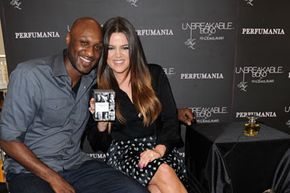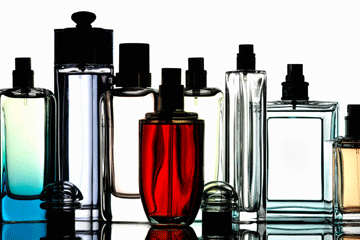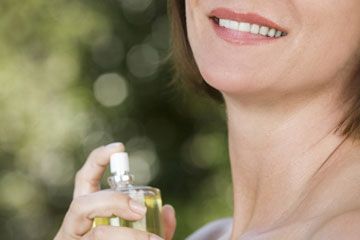Centuries ago, women retired to their changing rooms, or "toilets" to freshen up. They used floral-scented waters to give these rooms a pleasing aroma, and often splashed them on their skin as well. Today, eau de toilette carries on that tradition and can be a pleasing alternative to perfume.
However, sometimes the labeling of the fragrances can get confusing. For example, fans of Chanel's No. 5 will find not only a perfume, but also a "No. 5 Eau de Toilette." On the other hand, some fragrances only come in perfume form, while others can only be found as an eau de toilette. Perfume and eau de toilette are two very different products, each with its own distinct applications.
Advertisement
Both perfume and eau de toilette consists of fragrant oils suspended in a solution of alcohol and water. Where these products differ is the concentration of fragrance within the bottle. While eau de toilette contains around 10 percent fragrance, perfumes contain 25 percent fragrance oils or more, making it much more potent.
When you apply your favorite perfume, the water and alcohol gradually evaporate, leaving just the fragrant oils behind on your skin. The more alcohol and water contained within the bottle, the faster the product evaporates, and the sooner the smell fades after application.
With more water and alcohol in the bottle, eau de toilette tends to fade fairly quickly, so you'll have to reapply throughout the day if you want your scent to last. Because perfume has a higher fragrance concentration, the scent tends to linger longer, which means you can apply your perfume in the morning and enjoy the fragrance late into the evening.
Of course, this variance in staying power isn't the only way to distinguish perfume from eau de toilette; these products also differ in price, where they are sold, and even the size of the bottle. Given the lower concentration of fragrance oils, eau de toilette tends to cost less than perfume, and can be found at many drugstores or pharmacies. A fine perfume, on the other hand, can only be found at a perfume counter or specialty fragrance shop. You'll typically pay much more for a bottle of perfume than an eau de toilette, but even a few drops of perfume pack a powerful punch, so a small bottle can last for years. Eau de toilette generally comes in a larger bottle, which allows you to reapply often without fear of running out.
Now that you know how to tell the difference between these two products, how do you decide which is right for you? Consider the season and the occasion before selecting a fragrance. You may not want to wear perfume to a backyard barbecue or a crowded theater because it's so potent. Instead, reach for an eau de toilette, which offers a light, refreshing scent that won't overwhelm everyone around you. If you're heading out for a night on the town or need a fragrance that makes a statement, choose perfume for its staying power and rich, complex scent.
Still can't decide between these two products? Consider an eau de parfum. With a fragrance concentration of 15 to 18 percent, eau de parfum serves as an excellent compromise when neither a perfume nor an eau de toilette will do.
Advertisement



